 |
||||||||||||||||||||||||||||||||||||||||||||||||||||||||||||||||||||||||||||||||||||||||||||||||||||||||||||||||||||||||||||||||||||||||||||||||||||||||||||||||||||||||||||||||||||||||||||||||||||||||||||||||||||||||||||||||||||||||||||||||||||||||||||||||||||||||||||||||||||
We have revised our privacy policy due to the introduction of the GDPR. If you do not want to receive the NECE Newsletter any more, please unsubscribe here. |
||||||||||||||||||||||||||||||||||||||||||||||||||||||||||||||||||||||||||||||||||||||||||||||||||||||||||||||||||||||||||||||||||||||||||||||||||||||||||||||||||||||||||||||||||||||||||||||||||||||||||||||||||||||||||||||||||||||||||||||||||||||||||||||||||||||||||||||||||||

|
||||||
| NEWS about NECE | ||||||
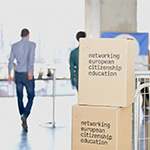 © Caroline Dutrey |
After NECE is before NECE Dear Readers, (Christoph Müller-Hofstede) |
|||||
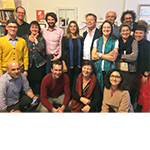 |
NECE Partners and Advisory Board Meeting Warsaw NECE partners from different European countries and the NECE Advisory Board met at an internal workshop in Warsaw, Poland. In separate and joint sessions, the international experts and practitioners in citizenship education discussed current developments and challenges their profession is facing on the European level. They also evaluated the NECE 2018 conference in Marseille in order to put the lessons learned into practice when preparing NECE 2019 in Glasgow. Another point of debate was the future strategic positioning of NECE as an international initiative promoting citizenship education: What role can NECE play on the European level? Which crucial partner organisations or networks operate in the same field? |
|||||
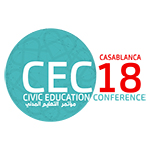 |
CEC III Civic Education Conference: The role of civic education for social cohesion From 3-7 December 2018, the third edition of the Civic Education Conference (CEC) took place in Casablanca (Morocco). The platform, inspired by NECE, focused on assessing the development of the sector and discussing the current state of civic education in the MENA region covering a variety of themes (digitisation, research in the Arab world, preventing violent extremism and rebuilding citizenship in post-conflict societies). More than 200 participants from the MENA states, Europe and other regions involving various backgrounds (civil society, academia, Media, corporate institutions and governmental bodies) were joined the gathering. |
|||||
 |
New NECE Focus Group on the Council of Europe’s RFCDC The Council of Europe’s Reference Framework of Competencies for Democratic Culture (RFCDC) was adopted in 2017, followed by the launch of a European Policy Advisers Network (EPAN) in 2018. As of 2019, a NECE focus group moderated by polis – The Austrian Centre for Citizenship Education in Schools and the DARE Network will explore the potential uses of the Reference Framework in different national and educational contexts. Claudia Lenz, who co-drafted the RFCDC, will act as lead expert. The teaser workshop at the 2018 NECE conference in Marseille led to a number of applications for the group, which now unites members from diverse educational contexts from Belarus, Germany, Italy, Switzerland, and The Netherlands. They will explore the use of RFCDC in their own institutional contexts and the focus group will serve as a sounding board for reflecting on and evaluating members' activities and as a general reflection on the possibilities and limitations of the current RFCDC. The first results will be expected for the NECE conference 2019. Regular information on the focus group will be provided via www.twitter.com/RFCDC_Austria (@RFCDC_Austria). Information on RFCDC in German: www.politik-lernen.at/demokratiekompetenzen |
|||||
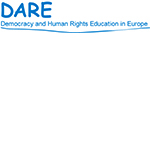 |
DARE Position Paper The DARE network - Democracy and Human Rights Education in Europe - has just released its position paper on the EU for Citizens programme under the proposed new Rights and Values fund (2021-2027). We are happy to share the position with you and hope it supports the current discussions on the future of this programme that is incredibly important, albeit still way too small. |
|||||
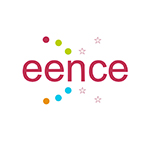 |
EENCE Meeting A successful gathering took place this summer in Ukraine from 21-27 June. 16 youth managers and trainers from 7 countries discussed how to plan and implement projects based on Weber’s method. They also covered the learning cycle and education through David Kolb's experiential learning theory and had time to work on the content of those methods. This working group and other activities are fundamental for upcoming new projects and new people involved. For this year and next year, EENCE is looking forward to expanding and engaging more specialists from different regions, formal institutions and NGOs, which will help to broaden the network’s impact. |
|||||
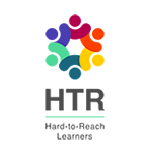 |
All=in Network (Previously “Hard to Reach Learners Focus Group”) Do you want to improve inclusion in citizenship education? Please join our mailing list! Creative energies at the NECE Marseille Conference 2018 suggested great ideas for new projects. Please contact us if you are interested in joining a small group to develop any of these ideas into an exciting project or to discuss how these projects might relate to your work and interests. Over the winter, we will be working in order to set up working partnerships, write realistic project plans and submit bids for funding. |
|||||
| FACING POLITICS | ||||||
In this section, we attempt to assess and analyse the changing political landscape that we are confronted with. Contributions from our NECE partners and Advisory Board members are always welcome. |
||||||
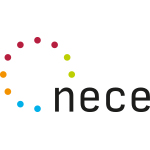 |
The EU budget 2021-2027 & Citizenship Education – Analyses by Maarten de Groot and Tony Venables with regard to the future of NECE In its ambition to become more involved in citizenship education on the European level and against the background of the Multiannual Financial Framework (MFF) by the European Commission as well as the results of the ECIT summer school (6-7 September 2018) and the manifesto, NECE has asked Maarten de Groot (ECIT campaign manager) and Tony Venables (European consultant and lobbyist) for a first analysis of the current state of play showing the potentials and motives for NECE. The project is to be continued in 2019. |
|||||
| Open access version “Reality lost“ now available!! We are happy to announce that the open-access version of the book “Reality Lost: Markets of Attention, Misinformation and Manipulation” from Vincent F. Hendricks and Mads Vestergaard, who made inspiring speeches at the recent NECE conference in Marseille, is now online. You can download it here. |
||||||
| GOOD PRACTICE: IDEAS & EXAMPLES | ||||||
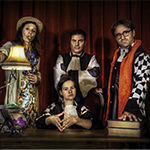 © Les Têtes de l’Art |
“Europe à la barre” – What if a trial was one of the most accurate ways to discuss about Europe?
In 2014, Les Têtes de l’Art created “Europe à la barre” (“Trial Europe”). This dramatised trial aims at experimenting a new form of debate that allows all stakeholders to address European issues in an innovative and efficient way. The intention was to mix theatrical expression with legal expertise and practical facts about the European Union in order to (re)gain the interest of European citizens. Actors, politicians and experts on the European Union meet on the stage. A mix of fiction and reality, humour is distilled into the seriousness of the speech and real witnesses express themselves before pretend lawyers. Europe is the accused in the dock; the actors’ role is to defend it or, on the contrary, to argue against it. Europe becomes human here, an incarnate object with qualities, defects and actions that it is possible to interpret. |
|||||
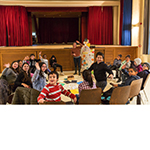 © Zentrum für Politesch Bildung |
Insights from our partners in Luxembourg: “Build your politician” – Workshop and visit at the parliament
On 20 November, on Universal Children’s Day, 100 children aged 8 to 12 visited the Luxembourg parliament and engaged in discussions with members of parliament. In the run-up to that meeting, six school classes and two youth groups from eight different municipalities “built their politician”, a man-sized cardboard figure. They covered it with their concerns, wishes and requests and finally presented “their” politicians and speeches to the deputies. As children aged 8 to 12 cannot take part in elections, this project enables them to participate in a different way, adapted to the context they live in and to be less reticent when engaging in a discussion with politicians in office. |
|||||
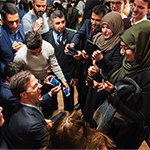 © ProDemos - The House of Democracy and the Rule of Law |
Politiek neighbourhood Café with the Dutch Prime Minister
On 7 November, ProDemos, in cooperation with the Library Schilderswijk, had the honour of welcoming the Dutch Prime Minister Mark Rutte in Schilderswijk. Schilderswijk is a neighbourhood in The Hague that has been struggling with multiple challenges. Due to these challenges, it has a rather negative image, although the neighbourhood has improved substantially in the last 10 years. During this evening, citizens living in Schilderswijk were able to put their questions to the prime minister directly and discuss topics that are important to them. The evening was a success. The event was attended by many citizens, children and adults, in addition to some media. More importantly however, this meeting showed that bringing the government and citizens together to discuss current societal challenges is a good way to find solutions. We should encourage this type of meeting to be held more often, also in other countries. |
|||||
| POLITICS & POLICIES & CITIZENSHIP EDUCATION | ||||||
| Debating Europe – Discuss your ideas with Europe’s leaders
Debating Europe is an online discussion platform where you can communicate your ideas and suggestions directly to policymakers and influential thinkers, in order to support or criticise vital issues that shape our future. Get involved and start debating now!
|
||||||
| Poland: Citizens Observatory of Democracy The Citizens Observatory of Democracy is a joint initiative of non-governmental organisations that promote principles and standards of democracy, the rule of law, respect for and protection of human rights, transparency and accountability of public administration and that advocate for an improved quality of legislation. It keeps track of changes to legislation made by parliament and government administration and the reactions from civil society organisations, legal professionals and citizens’ groups. The COD publishes reviews, opinions and position papers written by non-governmental organisations and civil-society institutions in response to legislation that affects civil rights and liberties, the democratic rule of law and the political system and defines the position of public and civil society organisations within the legal system. |
||||||
| EU PROGRAMMES AND EUROPEAN INITIATIVES | ||||||
| "Working Group on Promoting Common Values and Inclusive Education'': new mandate for 2018-2020 In 2009, the EU-Member States committed themselves to peer learning and the exchange of good practices, including the dissemination of outcomes, when they adopted the new Strategic Framework for European Cooperation in Education and Training (ET). At a June-2018 meeting in Vienna, the High Level Group on Education and Training endorsed the new mandates for the six existing ET 2020 Working Groups for the period 2018-2020. The “Working Group on Promoting Common Values and Inclusive Education'' concentrates on improving intercultural competencies, providing inclusive education for all learners and enhancing the European dimension of Education and Training. It will also focus on supporting school staff with regard to diversity issues. |
||||||
| EVENTS | ||||||
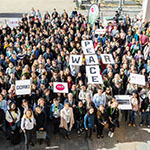 © bpb_Bildkraftwerk_Zöhre Kurc |
Review: History Festival "War or Peace. Crossroads of History 1918 | 2018" Berlin (Germany), 17-21 October 2018
On 17-21 October 2018, the Federal Agency for Civic Education (bpb) invited around 400 young professionals from more than 50 countries to the history festival WAR OR PEACE. Crossroads of History 1918 | 2018 in Berlin in cooperation with the Maxim Gorki Theatre. Kicked off by an opening ceremony with an inspiring keynote by Professor Achille Mbembe, the participants engaged in various workshops to work on topics concerning World War I and its aftermath. Using innovative and unusual methods, they discussed different narratives and unknown perspectives on the past and present. Theatre, exhibitions, guided tours and various other interactive formats rounded off the programme.
|
|||||
| “What Comes After the Nation State?” – Insights from a one day Congress hosted by European Alternatives In September, European Alternatives organised the one-day Congress “What comes after nation-state” in collaboration with the International Literature Festival Berlin where thoughts for a future beyond the nation-state were discussed. With varying debates and artistic formats and experts from all over Europe, the Congress dealt with many questions and challenges currently facing Europe: Whether it be financial crises, social movements, the rise of the far-right or the cities of change and solidarity, the Congress clearly underlined: we need to make proposals and not only react. Read the full review here. |
||||||
| Who is the Generation of Transition in Eastern Europe? You’ve probably heard of the Generation Y. The stereotypes say that its representatives live with their parents and don’t want to work, but that they have a cause and care about their work-life balance and personal fulfilment Our research, conducted with the support of the bpb, demonstrates that the equivalent of that generation is different in Eastern Europe. The so-called Generation of Transition describes those born between 1975 and 1995 and who came of age in the years following the collapse of communism and the end of the Cold War in 1989/1991. The 49 interviews and numerous studies show a generation that is quite distrustful of others, of political and civic institutions and is quite disengaged, especially the second cohort (born between 1985 and 1995). Based on the findings, Sofia Platform (Bulgaria), in cooperation with DRA e.V. (Germany), organised the international conference „The Generation of Transition in Eastern Europe: A Generation of Uncertainty – a Generation of Distrust?“ on 22-23 November in Sofia, Bulgaria. Our recommendations and the final version of the study will soon be distilled a publication. More information is available on Sofia Platform’s website. |
||||||
| Wanted: Your Contribution to the NECE Newsletter! | ||||||
| Are you involved in citizenship education in Europe or North Africa? Are you running projects aimed at promoting democratic values and tolerance in your country or region? Do you think NECE (and the readers of this Newsletter) should know about your project and do you want to enlist their support/advice? Tell us about it! We love hearing from you! Send your contributions, ideas, comments, and questions to: nece-newsletter@labconcepts.de |
||||||
You receive the NECE Newsletter because you subscribed and have confirmed that you wish to receive information about the NECE-Networking European Citizenship Education initiative. If you would like to unsubscribe, please click here. |
||||||